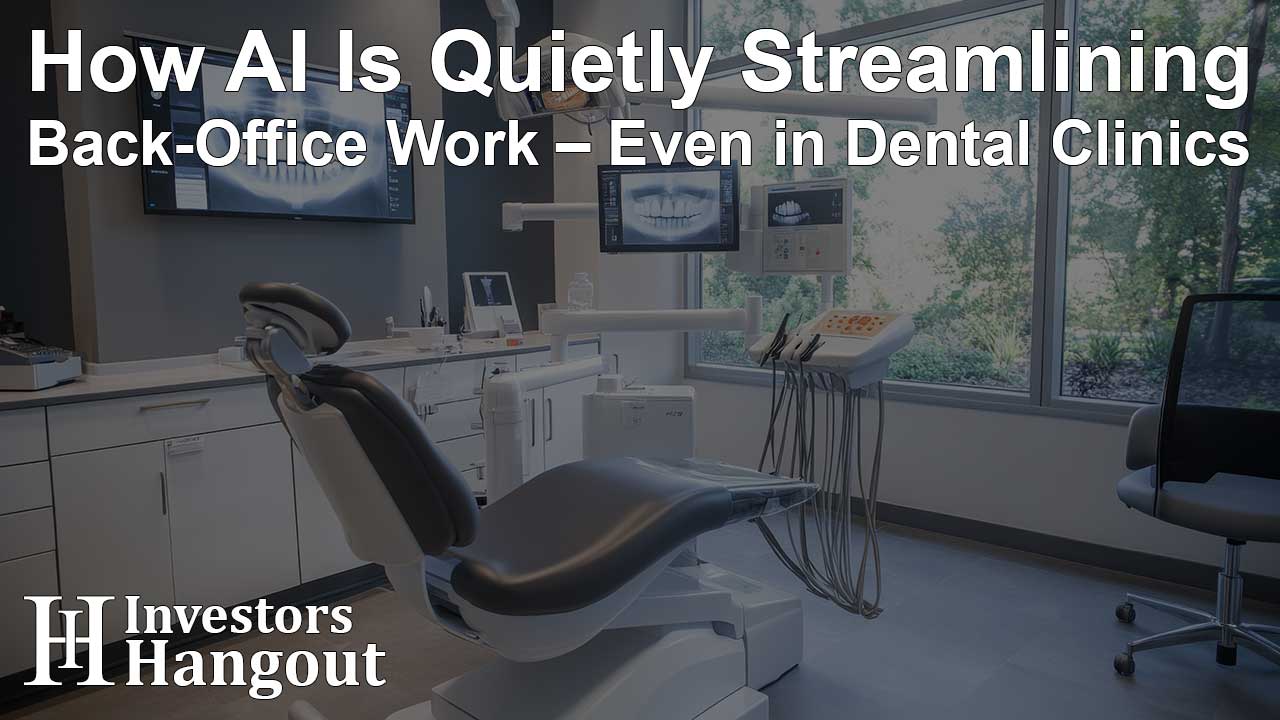How AI Is Quietly Streamlining Back-Office Work – Even in Dental Clinics

When people talk about artificial intelligence, the focus often lands on splashy topics like stock trading algorithms, self-driving cars, or chatbots. Yet some of AI’s most practical uses are quietly happening in places we rarely think about. Behind the scenes, offices big and small are finding that AI can handle repetitive tasks better than humans. Nowhere is this more evident than in healthcare, where front-desk and billing duties are getting a digital makeover.
In fact, one of the best examples comes from dental practices. Many clinics are experimenting with an AI receptionist for dentists to handle everything from scheduling and reminders to payment processing. The work is not glamorous, but it keeps the clinic running smoothly. And that’s the point: when these tasks are automated, professionals can focus on what matters most—whether that’s treating patients or planning for growth.

Photo by Daniel Frank
The Shift Happening Behind the Scenes
AI is not taking over entire businesses overnight. Instead, it’s carving out small but important roles in daily operations. Consider the endless cycle of booking, confirming, and rescheduling appointments. For humans, this can be time-consuming. For AI, it’s routine. Software can now manage calendars in real time, send reminders through text or email, and reduce no-shows without adding extra stress on staff.
Billing is another area where back-office AI shines. In healthcare, small errors can cause big headaches. Automating claims submissions, insurance verification, and payment tracking saves both time and money. The same logic applies outside healthcare. In financial services or investment firms, AI tools help with reconciliation, data entry, and fraud detection—roles that used to eat up hours of human effort.
Lessons from Healthcare for Investors
Investors often look at innovation in terms of broad market shifts. But AI in healthcare offers a more grounded example. When you see how AI cuts administrative waste in a dental office, it’s easier to imagine what similar tools can do in finance. Think about portfolio management dashboards that pull data instantly or reporting tools that auto-generate client updates.
The takeaway is clear: the less time people spend on repetitive work, the more they can spend on strategy. For investors, that might mean deeper market analysis or better client communication. For dentists, it means more time in the chair with patients instead of on the phone with insurers.
Why Automation Works in Quiet Spaces
AI thrives in places where rules are clear and data flows are structured. Appointment scheduling, payment reminders, and data entry fit that description. These tasks don’t require deep human judgment but demand accuracy. That’s why automation is so effective here.
Interestingly, the financial sector has many of these same “quiet spaces.” Reconciling spreadsheets, processing transactions, or compiling compliance reports can all be handled by AI systems. These are not headline-grabbing tasks, but they are essential to daily operations.
The Human Role Remains Essential
It’s important to note that AI does not erase the need for human staff. Patients still want to speak to a real person when something goes wrong. Clients still value an advisor who can explain market shifts in plain language. Instead, AI complements human work by taking the busywork off the table.
In a way, AI acts like a dependable assistant. It never gets tired of sending appointment reminders. It never overlooks a decimal point in a claim form. And it never loses track of time zones when confirming calls with clients across the globe.
Drawing Parallels Across Industries
The connection between healthcare and finance may not seem obvious at first. But both rely heavily on trust and efficiency. A clinic that mishandles billing risks losing patients. An investment firm that misses deadlines risks losing clients.
Here’s how the parallels line up:
- Scheduling and reminders: In healthcare, AI reduces no-shows. In finance, it ensures meetings and reporting deadlines stay on track.
- Billing and compliance: Clinics benefit from fewer rejected claims. Financial firms benefit from fewer regulatory errors.
- Data organization: Patient charts are easier to manage with automation. Market data becomes faster to analyze with the same logic.
Both industries show how AI helps keep the gears turning smoothly.
The Investment Angle
For investors, the rise of back-office AI creates two clear opportunities. First, there’s the chance to invest in companies developing these tools. While much of the attention goes to consumer-facing AI apps, the steady demand for behind-the-scenes automation is just as valuable. Second, there’s the operational edge. Investors who use AI internally can run leaner, faster firms.
What’s interesting is how small improvements stack up. Saving ten minutes on every client report or reducing the time spent chasing invoices might not sound revolutionary. But at scale, the hours add up. That’s when firms see measurable gains in productivity and profit.
A Quiet Revolution with Big Potential
The beauty of back-office AI is that it does not need fanfare. It works quietly in the background, often unnoticed until you step back and see how much time and energy it has freed. Dental clinics, of all places, are proving how valuable these tools can be. And if that model holds true, investors can expect the same kind of ripple effects across their own industry.
The future of AI is not only about big breakthroughs. It’s also about steady, reliable support in the daily grind of work. Whether in a clinic or a financial firm, that kind of help is worth paying attention to.

Photo by Daniel Frank
Final Thoughts
AI in back-office roles is less about replacing people and more about creating breathing room. The more businesses embrace this kind of quiet efficiency, the more space they’ll have for creativity, strategy, and human connection. For investors, watching how healthcare uses AI today could offer clues about where opportunity lies tomorrow.
About The Author
Contact Addison Perry privately here. Or send an email with ATTN: Addison Perry as the subject to contact@investorshangout.com.
About Investors Hangout
Investors Hangout is a leading online stock forum for financial discussion and learning, offering a wide range of free tools and resources. It draws in traders of all levels, who exchange market knowledge, investigate trading tactics, and keep an eye on industry developments in real time. Featuring financial articles, stock message boards, quotes, charts, company profiles, and live news updates. Through cooperative learning and a wealth of informational resources, it helps users from novices creating their first portfolios to experts honing their techniques. Join Investors Hangout today: https://investorshangout.com/
